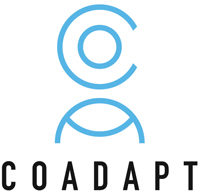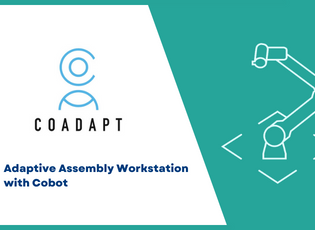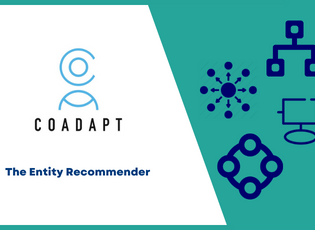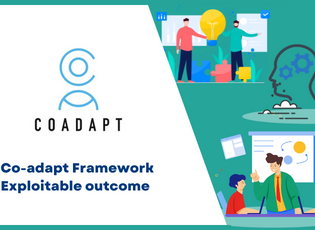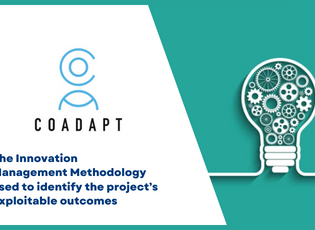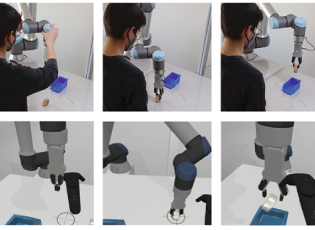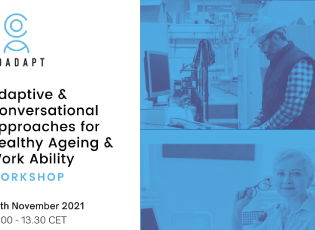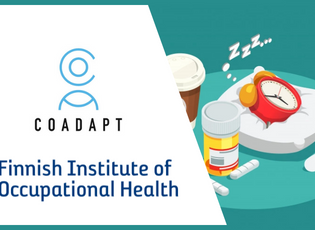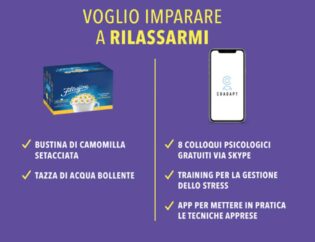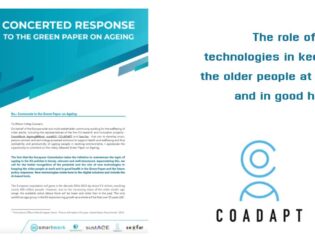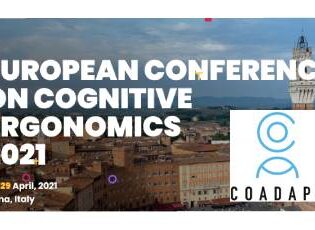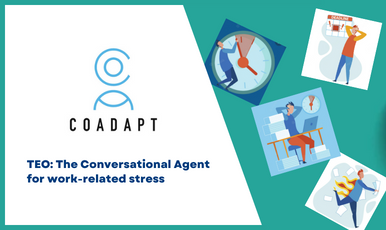
TEO (D.5.4) represents the Conversational Agent included within a wider application for smartphones, together with other tools such as exercises and guides.
This app has been developed for patients involved in psychological treatment to support the delivery of psychological programs for work-related stress, anxiety, and depression.
The application is designed to be used in a clinical context, to support the work that the patient carries out with the Mental Health professional, thanks to a digital coach available 24 hours a day for the patient, and customizable by the professional. In fact, the purpose of the App is to provide personalized interventions able to enhance the work done during therapy sessions in daily life. Therefore, the app aims to generalize what has been learned in an hour of work with the psychologist, to everyday life.
Psychological programs delivered by the app (exercises, guides, readings, and other psychological tools) are meant to be used in daily life and present two main goals:
- emotional and cognitive insights, allowing the patients to become more aware of their reactions to an event, their emotions, and thoughts.
- learning and strengthening emotional state management skills
Thanks to machine learning, the app learns which set of psychological exercises and programs are the most effective for each specific patient. Moreover, the app allows one-to-many interventions. The availability on patients’ smartphones makes this app a just-in-time solution available in any need: a “friend in your pocket”, always present as support in emotional management. Hence, the leading features of this tool are:
- personalized interventions,
- scalability,
- availability,
- readiness &
- the customizability of the experience.
Furthermore, the integration of this system in the clinical practice makes the treatment different and more sustainable compared to the traditional ones. The connection between the user’s application and the professional’s dashboard allows for a constant link between the two parts: through the performance exercises by the user, the professional has the ability to monitor the emotional states and well-being that their patients experience during the week, transforming this tool into an “informational bridge” that covers the space between sessions. This way, the app delivers more effective interventions and significant time saving:
- before the session with the patient (organization of topics to be discussed and materials useful for the session),
- during the session with the patient (helping the therapist to focus on more significant and strategic issues, based on what the patient has noted in-app)
- overall therapeutic path (making the work that the therapist and patient carry out more stable, thanks to a coach available 24h throughout the week)
On the other hand, the chance to customize the exercises and other tools by the professionals (and the ability of the AI to learn about the best strategies for each individual) allows the patient to learn the more effective skills to manage their specific situation and support the generalization of those skills in their daily lives, thus increasing the extent of the intervention, and making it more efficient.
Leadership and partners involved
The Conversational Agent is the result of a successful collaboration between two Co-Adapt partners: IDEGO and the University of Trento
- IDEGO Srl is a Digital Psychology company dealing with the development of innovative technological solutions to support clinical practice; specifically, through virtual reality and other software, it offers a toolset for mental health professionals to treatments more efficient and engaging, in the direction of a more sustainable and less stigmatized psychology. To pursue this goal, IDEGO is also committed to the training of psychologists by giving them a digital footprint in line with the times. In terms of corporate training, IDEGO provides its knowledge and its tools for companies courses focused on strengthening soft skills or customized to specific needs.
- The University of Trento (UniTN) is a medium-sized University in Italy, constantly ranked among the best Italian Universities. This result is due to the University’s ability to finance itself, its success in scientific research, its ability to look toward Europe, and the world, and the satisfaction of the students. UniTN has extensive experience with the management of projects funded under FP7. It was awarded 119 projects and it was the coordinator of 42. As for H2020, 65 projects have been approved so far. UNITN is part of HIT (Hub Innovazione Trentino), and an associated partner of the EIT-ICTLabs KIC. The Department of Information Engineering and Computer Science (DISI) was established in January 2002.
Market and competition analysis
Digital solutions related to supporting mental health are relatively new deployments, but the market is rapidly growing. The global mental health apps market size was valued at USD 4.2 billion in 2021 and is expected to expand at a compound annual growth rate (CAGR) of 16.5% from 2022 to 2030. Rising utilization of mental health apps owing to their benefits in improving treatment outcomes and lifestyle and increasing awareness regarding mental health as a significant health condition are some of the major factors boosting the market growth.


Figure11: Mental health market
The COVID-19 pandemic has led to an increase in the utilization of mental health apps across the globe. Lockdowns in several regions of the world and increasing loneliness and disbalance in the work and professional life leading to burnouts during the pandemic increased the adoption of mental health apps. The increasing prevalence of anxiety and depression disorders and growing awareness regarding mental health apps for the treatment of these conditions are some of the major factors supporting the segment growth. The stress management segment is projected to grow at the fastest rate. The rising prevalence of stress and related disorders and increasing adoption of applications that are beneficial in stress reduction and management are the pioneering factors fueling the growth of the segment. North America dominated the market in 2021 but the Asia Pacific and Europe are expected to register a substantial growth rate due to the rising demand for connected devices and the growing adoption of smartphones in the regions.
Mental health in the workplace: the coming revolution. There is a coming revolution in how private companies and public/ policymakers think about, talk about and cope with mental health issues: what has been the “don’t ask, don’t tell” approach to mental health is becoming instead “do ask, do tell, lets’ talk”. Even before COVID19 behavioral health problems such as anxiety, stress, and depression were widespread, constituting leading causes of diminished well-being and reduced productivity with a related increase in health costs. Companies are increasingly deploying measurements to improve employees’ well-being. Market research shows that ON DEMAND mental health support is a wanted benefit of a new job offer.
AI solutions supporting mental health professionals: a blue ocean opportunity. As discussed, there is a growing interest in digital mental health applications, either b2c, directed to patients, or b2b as a service to companies (employers) in order to help their employees connect with professionals. The market is currently booming on connecting platforms promising 24/7 support for people in need. However, we believe that while major progress has been made on enhancing connectivity and usage of digital tools, mental health professionals, and psychotherapists, in particular, lack supportive AI solutions and proper training in order to use those new technologies. This is a very new approach in mental health therapy and requires the involvement of interdisciplinary fields. The identified needs are the scope of our approach and further exploitation.
Exploitation roadmap
During the project results obtained from the testing of the app will be given back to the professional psychologists and psychotherapists (starting in Italy), as well as the added values that this tool brings to the management of clinical practice. The communication plan will last 6 months (until December 2022) and it will include: a website, post, infographic for social media, and articles in scientific journals and magazines.
It will also be shown the app in its structure and main functions, for knowledge purposes. The communication plan will conclude with a seminar aimed at the acquisition of institutional patronage from regional associations of psychology.
At the end of the 9-month demo, the goal will be to place the app on the market for a fee; this service will be provided along with a training course to train psychologists about the usage of the app and make it a standard tool for treatments.
The aim is to start by converting the largest number of cognitive-behavioral therapists who will take part in the demo into professionals who will join the paid program, then expanding the pool of users, bringing this tool into daily practice.
